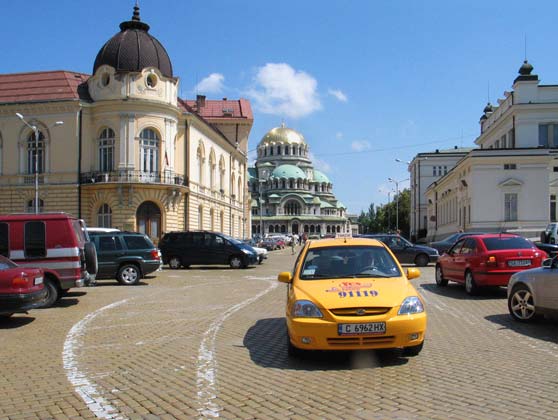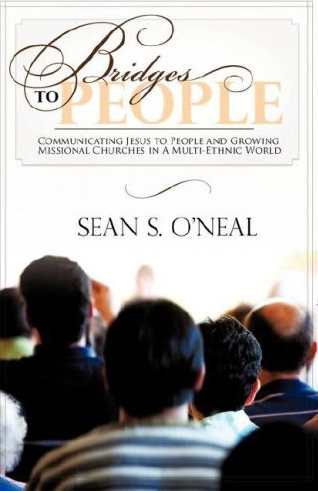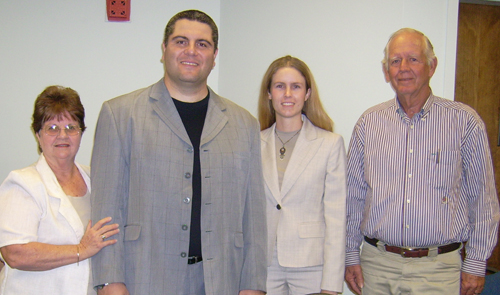Doing Missions in the Spirit
This message is not even 30 minutes long, but I challenge you to take the time and listen to it today. If you do not sense the Spirit of God in the first five minutes, feel free to turn it off. I truly believe that this is a message from God that every minister, missionary and church must hear. It was preached at the annual mission’s conference organized by the Good Shepard Church of God in Pahokee, Florida under the title “Doing Missions in the Spirit.” What are you going to do when governments, organizations or finances do not permit you to do missions? What are you going to do when people and problems send you to the periphery of ministry, while God has called you to the epicenter of missions? All these questions and many others are answered in “Doing Missions in the Spirit.”
Click on the link to download and listen to the message https://cupandcross.com/mp3s/missioninspirit.mp3
Building Bridges to People while Doing Urban Missions in the Spirit
My longtime friend, mentor and colleague, Sean O’Neal, who serves as the the Director of Evangelism and Youth Ministries for the Church of God California/Nevada State Executive Office, has published his dissertation work under the title “Bridges to People.” The book is one of a few, if not the only published academic research on urban missions from a Pentecostal perspective.
But the text is much more than just a dissertation project. It is a practical application emerging from over two decades of urban missions work across America, which is intended to be used as a training tool for pastors and congregations who are involved in cross-cultural urban ministry.
Sean’s ministry begins in Indiana and moves to Chicago metro where the church he pastors transforms into a multicultural center ministering to Bulgarian, Romanians, Hungarians and Mexicans and building bridges between ethnic groups within the Kingdom of God. The practical experience, which becomes the basis and the heart of the publication redefines the philosophy of modern day urban ministry in the 21st century. The claim that the book defends over and over is simple: the effectiveness of urban ministry depends on its origin in the praxis of ministry. And this is a truly Pentecostal claim, as it places the practical experience of faith within the multicultural context of ministry before all theological and philosophical presuppositions.
I know that by now, most of you who are involved in any type of urban ministry are already asking the question: “Will this work for me?” It worked for Sean and the ministers whom he trained to recognize the need and provide the needed ministry. The principles which he defines and describes come directly from his experience within the multicultural ethnic context of Chicago (1990-1998), New Jersey and New York (1998-2002), Urbana (2002-2004) and California, where he currently teaches and ministers.
“Bridges to People” is intended to be used exactly the way it was developed: in a practical self-growing, self-testing and self-accountable ministry. It is a cross-cultural training manual for ministries and churches through redefining the ethnic reality of your community. Its objective to build a multi-facet cross cultural ministry makes it applicable not only for American based organizations, but for international ones as well. And last, but not least: it is written from a Pentecostal perspective, giving a central place of the work of the Holy Spirit building bridges between people across cultures and redefining doing missions in, from, by and with the Spirit of God.
“Bridges to People” can be purchased at Amazon.com by clicking on the following link: http://www.amazon.com/Bridges-People-Sean-S-ONeal/dp/1602662681/ref=sr_1_1?ie=UTF8&s=books&qid=1205607996&sr=8-1
Cup & Cross Ministries with a New Website
Since 1999, the website of Cup & Cross Ministries has become an international media center for evangelical churches in Eastern Europe. It has served as a reliable source of information for the ministry and developments of the Bulgarian Church of God publishing official statistics, interviews with church leaders, in-depth research and much more. Through this efforts, the website has become an information bank for Bulgarian Pentecostalism used by denominational medias, research centers, Bulgarian and foreign government and non-government organizations including the U.S. Department of State.
The new design and functionality of the website offers a large spectrum of text, audio and video materials which inform of the scope of our ministry. The renovating technologies implemented in the new web center allow visitors to receive regular news updates via email or text message on their cell phone. The audio streaming allows the live delivery of sermons and audio content, while the video option will allow us to broadcast live ministry events from Bulgaria, hold video conferences with team members and provide an opportunity for churches to publish broadcast information about their ministry in video format.
Recently, the national overseer of the Bulgarian Church of God asked our team to assist with the PR of the denomination while informing and promoting the ministry of the church via the internet and other medias. This new media strategy will include broadening the coverage through regular ministry reports of the dynamics and activities of the denomination, introduction of churches and ministers, interviews, statistics and analysis. Having received this great responsibility, Cup & Cross Ministries is committed to continue the mission of bringing up to date reliable information about the Bulgarian Church of God and to serve toward the broadening of its media ministry strategy in the 21st century.
A New Website for Pastors Released
Two years ago Cup & Cross Ministries released the first Bulgarian website dedicated to the ministry of the pastor. The website was built to accommodate the needs of the Bulgarian fellowship for pastors and to promote the pastoral ministry as a whole. Recently, we decided to broaden the perimeter of this ministry and offer a new website for pastors (http://www.Pastir.org) which will provide news, sermons, music, video presentations, round tables and so forth. This effort promotes the establishment of a nationwide web community of pastors that encourages interaction between clergy, church members and unchurched people, and provides a platform for discussion of vital issues within the realm of ministry.
History of the Bulgarian Church of God
The prehistory the Bulgarian Church of God is rooted in the rise of the Protestantism on the Balkans in the 1800s when American missionaries were allowed to enter the Ottoman Empire. As early as 1827 The British Bible Society began working on a Protestant translation of the Bulgarian Bible. In 1871 the first Bulgarian Protestant Church was founded in the town of Bansko. In the next year the American Missionary School was established in the town of Samokov. In 1878 Bulgaria was liberated from 500 years of Turkish yoke, and during 1890-1910 a great number of Protestant denominations, among which Methodist, Baptists, Lutherans and Congregationalists started local churches throughout Bulgaria.
In 1923 Ukrainian immigrant Zaplishny traveled to Russia to preach the Pentecostal message. On the way his ship stopped at the Bulgarian port of Bourgas where he preached in the Methodist church and several are baptized with the Holy Spirit. This event marked the beginning of Bulgarian Pentecostalism, which in the next few years spread throughout the country.
In the 1930s the movement called itself the Bulgarian Pentecostal Union (now affiliated with the Assemblies of God). A more conservative Pentecostal group with congregations located mainly in Northern Bulgaria emerged and formed the union called The Northern Brothers (or Tinchevists after the name of the leader Stoyan Tintchev). The group called themselves the Church of God. After the 1944 Communist Revolution in Bulgaria it continued its existence as an underground organization and was severally persecuted. In the 1980s the Bulgarian Church of God established connection and became a part of the Church of God (Cleveland, TN).
Missions Conference at Pahokee, FL
We are ministering today at the Good Shepard Church of God in Pahokee, FL. We have been regular attendees of the mission conference organized by the church for several years now. Our first visit to the church was in 1999 while promoting the building project of the Central Church of God in Sofia, Bulgaria. Through the years we have been blessed by the ministry of the Good Shepard Church and we are always excited to visit with the congregation. At the conference this year, on Sunday morning, along with ministry the word, we presented our newly released film Revival Bulgaria 2, which purposed to give a report of our work in Bulgaria.
Three Creeds Against Religious Education Plan
 The Bulgarian Orthodox Church expressed disagreement with the program for religious education in the Bulgarian schools proposed by the Ministry of Education. The opinion of the Orthodox Church was supported by the Bulgarian Catholic Church and the Chief Mufti’s Office. The three institutions insist that instead of studying history of the origin, development, and ideas of the different religions, students should study a religion of their choice.
The Bulgarian Orthodox Church expressed disagreement with the program for religious education in the Bulgarian schools proposed by the Ministry of Education. The opinion of the Orthodox Church was supported by the Bulgarian Catholic Church and the Chief Mufti’s Office. The three institutions insist that instead of studying history of the origin, development, and ideas of the different religions, students should study a religion of their choice.
The clergy proposed that religion classes should be twice a week, from first to 12th grade. The students who do not want to study religion should be able to choose to study ethics instead. The instructors who will teach religion should have either a bachelor’s or a master’s degree in theology or they should have gone through a special training. Read more
4,000 Bulgarians Receive Daily Bible Verse
Over 4,000 Bulgarians worldwide receive daily a Bible verse directly to their cell phones from the Christian mega portal www.bibliata.com. Similar active applications include the English website “Ecclesia”, the Australian Bible Society and the American mFaith and OSministry. The service offered by our website www.bibliata.com was initiated in 2002 and it has remained free of charge for all subscribes since then. The service is offered via the major Bulgarian GSM operators MTel and GloBul. Registration is done online at: sms.bibliata.com. There is also an option to receive the verse via email.
Minstering at Gaffney, SC Again
After much prayer and anticipation, we were again able to hold a series of services in South Carolina. While through its history our ministry has been closely connected to churches in this region of the country, it has been awhile since we have had the opportunity to minister there. The recent services in the State reconnected us with our past history in ministry and reinforced our vision for the future. We are thankful for the given opportunity and the multitude of friends we were able to see once again.
Minstering at Ft. Inn Christian Academy
What an exciting time we had at the Ft. Inn Christian Academy in Greenville, South Carolina. Our visit there was on the spur of the moment upon the invitation of the leadership of the school. Ft. Inn Christian Academy is one of the few Christian schools in the Carolinas associated with the Church of God. It was a thrill to speak with the students who surprised us with their interests in Biblical topics. Usually, when we minister in schools across the country, teenagers would ask about Bulgarian culture, our ministry there and perhaps some curios facts. This was not the case at the Ft. Inn Christian Academy, where the first questions were about the Bible and more specifically the Book of Revelation. We discussed topics of eschatology such as the 70 weeks of Daniel, prophetic signs of the End Times, the spirit of the Antichrist, the mark of the Beast and many others. It is encouraging in this day and time to meet with young people who have such knowledge and interest in the Bible.









